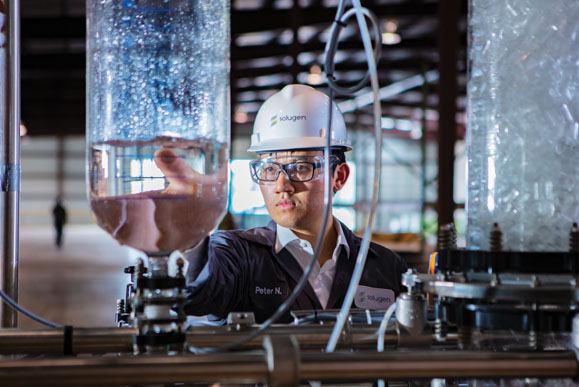(Andy Corbley) Solugen’s mission is to decarbonize the chemicals industry—and their secret weapon comes from nature’s own biology.
Related Anti-Mosquito Diets: 3 Foods to Eat to Keep Mosquitoes at Bay
by Andy Corbley, July 11th, 2020
For several years now, the Houston-based chemical engineering startup has been making hydrogen peroxide out of a yeast enzyme, and have used this eco-friendly product to create cost-competitive replacements for heavy-duty chemicals used in treating oil-drilling wastewater, spas, pools, and plumbing.
Emerging on the Forbes magazine’s Next Billion-Dollar Startup list, the company has also retooled to make (and donate) hand sanitizer during COVID-19; and their fantastic natural cleaning wipes, an early product for them, was spun-off into a company that sold for millions.
While researching drug candidates for cancer, one of Solugen’s founders, Gaurab Chakrabatri, discovered that yeast he was observing in cancer cells contained an enzyme that produced hydrogen peroxide, one of the principle ingredients in most cleaning products.
Desiring to pursue his idea in the marketplace, he teamed up with a friend from school named Sean Hunt, a graduate student in chemical engineering, to launch Solugen. The value of their products is that the process to make them didn’t require the use of petroleum products at any stage of production, rendering the cleaning agent effectively “all-natural” and essentially carbon-neutral.
The enzymatic process Solugen used to create their bioperoxide also happened to instill organic acids that, when used to clean machinery, dissolved mineral scale buildup that clogs and degrades pipes—which expanded the potential uses considerably.
What Hunt and Chakrabatri now had in their hands was something that could be used in all kinds of intense cleaning jobs, including for oil and gas cleanups, but was, at its core, natural and created from living biology instead of artificial chemical engineering.
Book The Energy Evolution: Harnessing Free Energy From Nature (Ecotechnology)
Cleaning up in the cleaner business
Suggesting that maybe the enzymes could be used to create hydrogen peroxide at scale, Chakrabatri and his partner Hunt submitted their idea to an MIT pitch competition and took a finalist prize of $10,000, which they quickly employed in funding the acquisition of PVC piping from Home Depot and water pumps from Ebay to begin creating 5-gallon jugs of their hydrogen peroxide cleaner.
Through Facebook they created a flourishing business selling their product PeroxyZen to spas for use as a pool, sauna, and hot tub cleaner, as it not only sanitized surfaces but dissolved mineral buildups in the plumbing. Since the product came by way of a natural process, spas were keen on using it in order to market themselves as “all natural”.
After conquering Texas spas, they moved into the cleaning wipes business, producing their bioperoxide and utilizing their marketing skills to build a company called Ode to Clean, supplying wipes made of plant fibers—another “all natural” marriage.

After selling their wipes brand, Ode to Clean to Diamond Wipes, and expanding into a new 5-acre production facility, Hunt and Chakrabatri entered the $5 billion market of wastewater cleanup.
Big business
The process of drilling for oil and natural gas is a dirty one. It generally yields massive amounts of wastewater contaminated with mineral scales. Regulators like the U.S. Environmental Protection Agency require these billions of gallons to be cleansed before they’re repurposed for industry or agriculture.
Phosphate-based chemicals like hydroxyethylidene diphosphonic acid, an often used wastewater cleaner, emit around 3 tons of CO2 for every 1 ton produced. Solugen’s treatment actually removes 1.35 tons of CO2 per ton produced, helping companies add carbon offsets to their drilling operations. When Solugen was tested in the oil fields of one company that was suffering from reduced production due to clogged pipes, production was restored to normal levels through the cleaned pipes, without the use of additional acid treatments, which returned around $29 million in revenue previously lost.
“We believe we have a cost-competitive replacement, which also biodegrades where many chemicals in agriculture do not,” Chakrabarti tells a featured piece in Forbes.
They envision building “mini mills” that produce locally-desired chemicals for a small 200-mile radius, rather than relying on large-scale transportation services from their central plant in Houston.
The company’s revenue passed $12 million last year, and Hunt and Chakrabatri expect it to increase to over $27 million by 2021. However they are constantly reinvesting, and even borrowing, in order to expand and hire more employees.
About The Author
Andy Corbley
Andy Corbley is the founder and editor of World At Large, a small environment, travel, and lifestyle focused journal that stresses integrity, nuance, and honesty which launched in early March 2019.
Stillness in the Storm Editor: Why did we post this?
The news is important to all people because it is where we come to know new things about the world, which leads to the development of more life goals that lead to life wisdom. The news also serves as a social connection tool, as we tend to relate to those who know about and believe the things we do. With the power of an open truth-seeking mind in hand, the individual can grow wise and the collective can prosper.
– Justin
Not sure how to make sense of this? Want to learn how to discern like a pro? Read this essential guide to discernment, analysis of claims, and understanding the truth in a world of deception: 4 Key Steps of Discernment – Advanced Truth-Seeking Tools.
Stillness in the Storm Editor’s note: Did you find a spelling error or grammatical mistake? Send an email to [email protected], with the error and suggested correction, along with the headline and url. Do you think this article needs an update? Or do you just have some feedback? Send us an email at [email protected]. Thank you for reading.
Source:
https://www.goodnewsnetwork.org/solugen-natural-hydrogen-peroxide-cleaners-from-yeast/

Leave a Reply